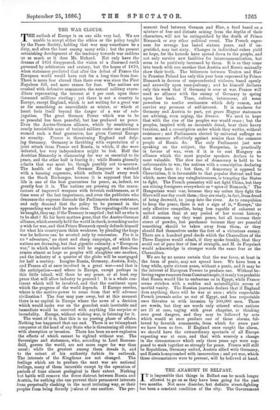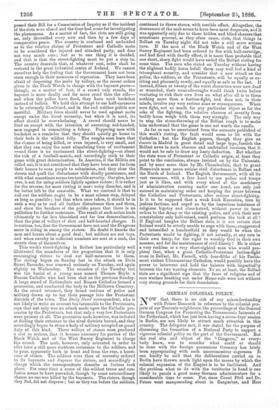THE ANARCHY IN BELFAST.
IT impossible that things in Belfast can be much longer i allowed to go on as they have been going for the past two months. Not mere disorder, but definite street-fighting has been a constant condition of the city. The Government passed their Bill for a Commission of Inquiry as if the incident of the riots were closed and the time had come for investigating the phenomena. As a matter of fact, the riots are still going on, Only diversified every now and then by a few days of comparative peace. The country is confused and undecided as to the relative claims of Protestant and Catholic mobs to be considered the injured and attacked party, and does not very much care ; but as to one thing it is decided, and that is that the street-fighting must be put a stop to. The country demands that, at whatever cost, order shall be restored in the great industrial centre of Ireland. We cannot ourselves help the feeling that the Government have not been stern enough in their measures of repression. They have been afraid of dispersing the mobs by volleys, as the recent orders given to the Black Watch to charge with the bayonet prove— though, as a matter of fact, if a crowd only stands, the bayonet is more deadly and far more cruel than the rifle— and when the police have fired, they have used buckshot instead of bullets. We hold this attempt to use half-measures to be extremely ill-advised, and in the end neither politic nor merciful. Military force should never be used against mobs except under the direst necessity, but when it is used, its effect should be overwhelming. A crowd should never be fired on except with the intention of executing, red-handed, men engaged in committing a felony. Peppering men with buckshot as a reminder that they should quietly go home to their beds is the wildest folly. The roughs soon learn that the chance of being killed, or even injured, is very small, and that they can enjoy the most stimulating form of excitement —and there is no excitement like street-fighting—at about the risk of a football-match, and accordingly stick to their game with great determination. In America, if the Militia are called out, it is not considered that they have been sent for from their homes to coax people to submission, and they clear the streets and quell the disturbance with deadly persistence, and 'with what sometimes seems too terrible severity. Our plea, how- ever, is not for using soldiers lightly against rioters ; it is rather for the reverse, for most rioting is mere noisy disorder, and is -far better left to the constable. What we contend is that to call out the soldiers ought to be a most solemn step, delayed as long as possible ; but that when once taken, it should be in such a way as to end all further disturbance then and there, and show the breakers of the public peace that there is no palliation for further resistance. The result of such action leads ultimately to far less bloodshed and far less demoralisation, than the plan of volleys of shot and half-hearted charges. It is curious, too, that the Government have not used the Dragoons more in riding in among the rioters. No doubt it knocks the men and horses about a good deal ; but soldiers are not toys, and when cavalry in sufficient numbers are sent at a mob, the streets clear of themselves.
This week's street-fighting in Belfast has particularly well illustrated the soundness of the proposition that it is only encouraging rioters to deal out half-measures to them. The rioting begun on Sunday last in the attack on Divis Street Barracks, was renewed seriously on Tuesday, and again slightly on Wednesday. The occasion of the Tuesday riot was the burial of a young man named Thomas Boyle, a Roman Catholic who had been shot on the previous Sunday. A large crowd of Nationalists and Roman Catholics formed a procession, and conducted the body to the Milltown Cemetery. As the crowd returned, they found cordons of police and military drawn up to bar their passage into the Protestant districts of the town. The Daily News' correspondent, who is not likely to write an account too favourable to the Protestants, says that not only was no attack made upon the Catholic pro- cession by the Protestants, but that only a very few Protestants were present at all. The procession mob, however, was irritated at finding their entrance to the rival districts barred, and they accordingly began to stone a body of military occupied on guard duty of this kind. These volleys of stones soon produced a riot so serious, that it became necessary for parties of the Black Watch and of the West Surrey Regiment to charge the crowd. The mob, however, only retreated in order to offer later a still more stubborn resistance to the soldiers, and to pour, apparently both in front and from the rear, a hurri- cane of stones. The soldiers were then of necessity ordered to fix bayonets and disperse the rioters, and accordingly a charge which the correspondents describe as furious took place. For some time a scene of the wildest terror and con- fusion seems to have prevailed, though by some extraordinary chance no one was killed by the bayonets. The rioters, though they fled, did not disperse ; but as they ran before the soldiers,
continued to throw stones, with terrible effect. Altogether, the demeanour of the mob seems to have been most desperate, and it was apparently only due to those hidden and blind chances that sometimes prevent, as they often cause, riots, that things in Belfast on Tuesday night did not take a still more serious turn. If the men of the Black Watch and of the West Surrey Regiment had been ordered to fire with ball-cartridge, and had fired with deadly effect, it is more than probable that one short, sharp fight would have ended the Belfast rioting for some time. The men who rioted on Tuesday without having the slightest bodily harm befall them may well feel a kind of triumphant security, and consider that a new attack on the police, the soldiers, or the Protestants, will be equally as ex- citing and pleasantly rowdy, and equally as safe as the last. If instead, fifteen or twenty of the worst characters were now dead or wounded, their comrade-roughs would think twice before venturing to risk their own lives on what after all is to them nothing more than a faction-fight, and does not, in their minds, involve any very serious aims or consequences. When men fight, not so much for any particular object as for the sake of the fighting, the relative chances of security from bodily harm weigh with them very strongly. The only way to stop the stone-throwing of the Belfast rough is to make him understand that the game is one not worth the candle.
As far as can be ascertained from the accounts published of this week's rioting, the fault would seem to lie with the Catholics; but the English papers, though they give an 6neute in Madrid in great detail and large type, furnish the Belfast news in such obscure and undetailed versions, that it would not be safe to draw any hasty deduction. But whether the riots were of Protestant or Catholic origin, at least they point to the conclusion, always insisted on by the Unionists, and by none more than by Mr. Chamberlain, that to grant Home-rule must mean serious civil disturbance in Belfast and the North of Ireland. The English Government, with all its vast resources, with a free hand to use police and troops just as it likes, and with every wheel of the machinery of administration running under one hand, can only just succeed in maintaining order and keeping the peace between the Catholics and Protestants, after serious street-fighting. Is it to be supposed that a weak Irish Executive, torn by jealous factions, and urged on by the imperious insistance of religious bigotry and class-hatred, without power to issue orders to the Army or the existing police, and with their new constabulary only half-raised, could perform the task at all ? If England bungles the Belfast riots, is it not certain that Ireland would be utterly unable to cope with them, exaggerated and intensified a hundredfold as they would be when the Protestants would be fighting, if not actually, at any rate in their own fancy, for the right to worship God in their own manner, and for the maintenance of civil liberty ? He is either a very reckless or a very short-sighted man who would pro- phesy that, when a great Catholic-Protestant faction-fight arose in Belfast, Mr. Parnell, with four-fifths of his Parlia- ment violent Ultramontane Catholics, would possibly have the power to intervene and hold the balance with impartiality between the two warring elements. To us, at least, the Belfast riots are a significant sign that the fears of religious and of race warfare breaking out under Home-rule were not without very strong grounds for their foundation.



































 Previous page
Previous page